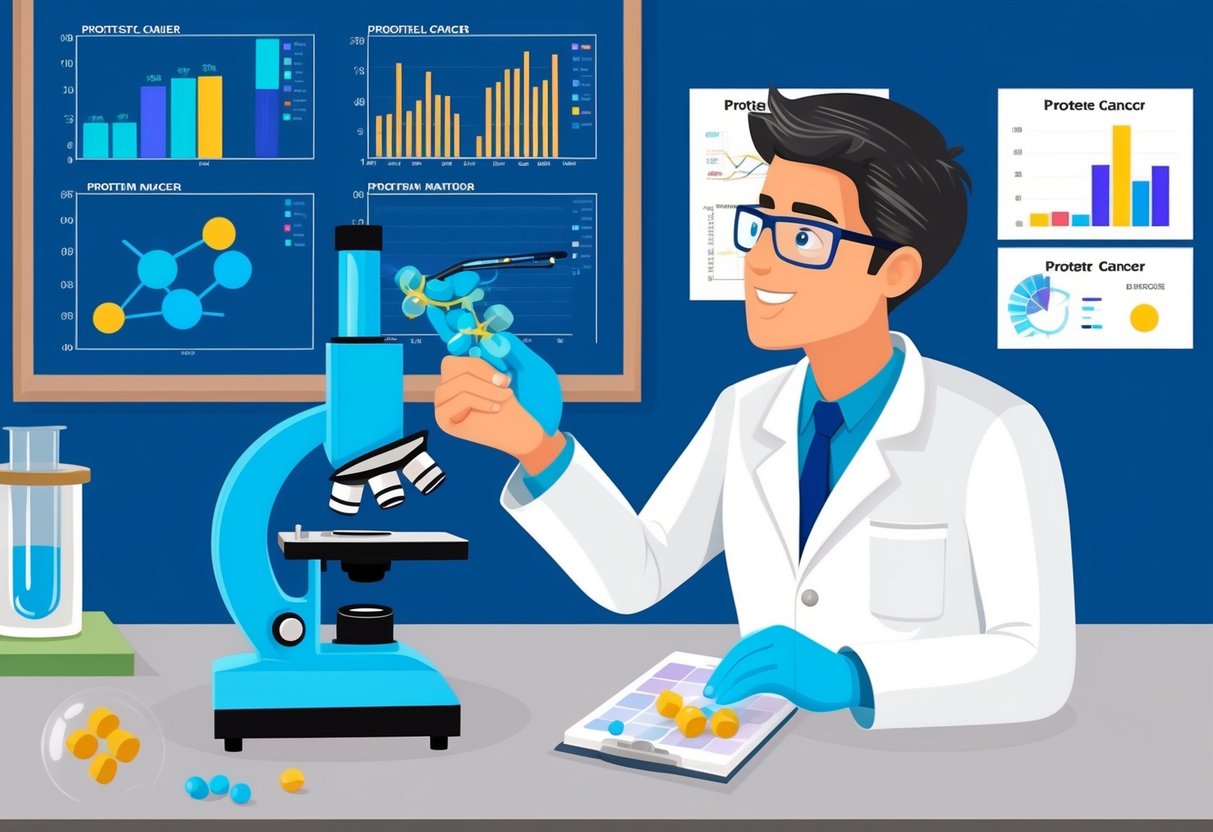Breakthrough Research from Sweeden Offers New Hope in Fighting Certain Types of Prostate Cancer – from www.sciencedaily.com
This research is new, it was published in December of 2024. It has not been tested on patients yet. It will be interesting to see what breakthroughs will be available as the research progresses. For the full article – click the link above.
Key Protein’s Role in Prostate Cancer
A groundbreaking discovery has shed new light on the potential treatment of aggressive prostate cancer. Research indicates that a specific protein, glycoprotein 130 (GP130), may be a crucial player in combating certain types of this disease.
GP130 functions as a cell surface receptor, initiating a signaling cascade when activated. This pathway influences gene expression, particularly through the activation of STAT3, a transcription factor that regulates cellular behavior. STAT3 has long been associated with tumor development and metastasis.
Contrary to previous assumptions, recent studies have shown that activating GP130 and its associated pathway can actually impede tumor growth. This finding challenges the long-held belief that blocking this protein would be beneficial in cancer treatment.
Key findings include:
- Activation of GP130 slowed tumor growth in mouse models
- Higher GP130 levels correlated with improved survival in human patients
- The immune system showed enhanced anti-tumor activity when GP130 was activated
This research opens up new avenues for potential treatments, especially for aggressive forms of prostate cancer that have proven difficult to manage with current therapies.
“Our results show that by activating the signaling pathway, not only does the growth of the tumour be slowed down, but the immune system is then stimulated to actively fight tumour cells,”
Lukas Kenner, visiting professor at the Department of Molecular Biology at Umeå University.
Prostate cancer diagnosis and monitoring often involve several biomarkers:
| Biomarker | Description |
|---|---|
| PSA | Prostate-specific antigen, widely used for screening |
| PCA3 | Non-coding RNA, helps in diagnosis |
| PHI | Prostate Health Index, combines several markers |
| ConfirmMDX | Epigenetic test for biopsy evaluation |
While these biomarkers aid in detection and monitoring, the GP130 pathway presents a promising target for future therapeutic interventions. By stimulating the immune system and directly affecting cancer cell behavior, this approach could revolutionize treatment strategies.
Ongoing research aims to:
- Confirm initial findings in larger studies
- Develop targeted therapies that activate GP130
- Identify patient subgroups most likely to benefit from this approach
As molecular biology advances our understanding of prostate cancer, the interplay between proteins like GP130, transcription factors such as STAT3, and the immune system becomes increasingly important. This knowledge may lead to more personalized and effective treatments, potentially improving outcomes for patients with aggressive prostate cancers.
More Research into Proteins affecting Prostate Cancer Patients
Common Questions About Prostate Cancer Proteins

What are the newest treatments for prostate cancer in 2024?
Recent advances include targeted therapies that focus on specific proteins involved in prostate cancer growth. Drugs targeting overexpressed proteins show promise in preventing cancer spread. Precision medicine approaches tailor treatments to a patient’s genetic profile for improved outcomes.
How do protein-based therapies combat prostate cancer?
Protein-based treatments work by:
- Blocking growth signals
- Inhibiting cancer cell division
- Promoting cancer cell death
- Preventing metastasis
These therapies target specific proteins that play key roles in cancer progression, offering more precise intervention with potentially fewer side effects.
Which proteins are linked to prostate cancer advancement?
Several proteins have been associated with prostate cancer progression:
- Androgen receptor (AR)
- Prostate-specific antigen (PSA)
- Insulin-like growth factor 1 (IGF-1)
- Vascular endothelial growth factor (VEGF)
- Matrix metalloproteinases (MMPs)
These proteins influence cancer growth, survival, and spread through various cellular mechanisms.
What are the latest discoveries in prostate cancer research?
Recent breakthroughs include:
- Identification of new proteins that may inhibit tumor growth
- Improved understanding of genetic mutations driving cancer progression
- Development of more sensitive diagnostic tests
- Advances in immunotherapy approaches
- Novel imaging techniques for early detection and monitoring
Can dietary choices impact prostate cancer treatment efficacy?
Emerging research suggests diet may influence treatment outcomes. Key points include:
- High protein diets may affect IGF-1 levels
- Certain amino acids could influence cancer risk
- Plant-based proteins may have different effects than animal proteins
- Specific nutrients may enhance or interfere with treatments
Patients should consult their healthcare team before making significant dietary changes.
What role do heat shock proteins play in prostate cancer treatment?
Heat shock proteins (HSPs) are becoming important targets in prostate cancer therapy:
- HSPs help cancer cells survive stress
- Inhibiting HSPs can make cancer cells more vulnerable to treatments
- Some HSPs are involved in androgen receptor signaling
- HSP inhibitors are being investigated as potential therapeutic agents
Research continues to explore how targeting HSPs can improve prostate cancer outcomes.

